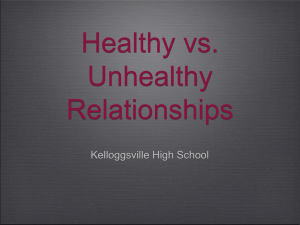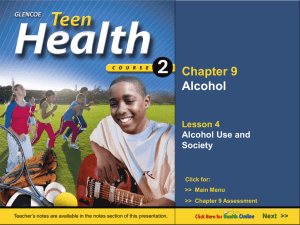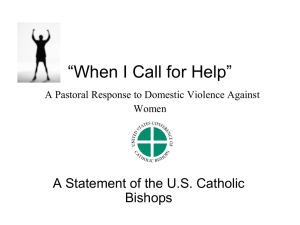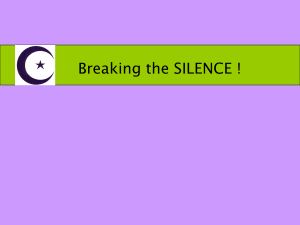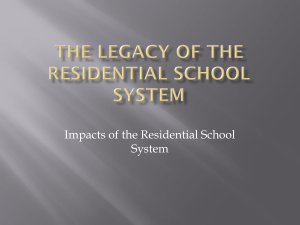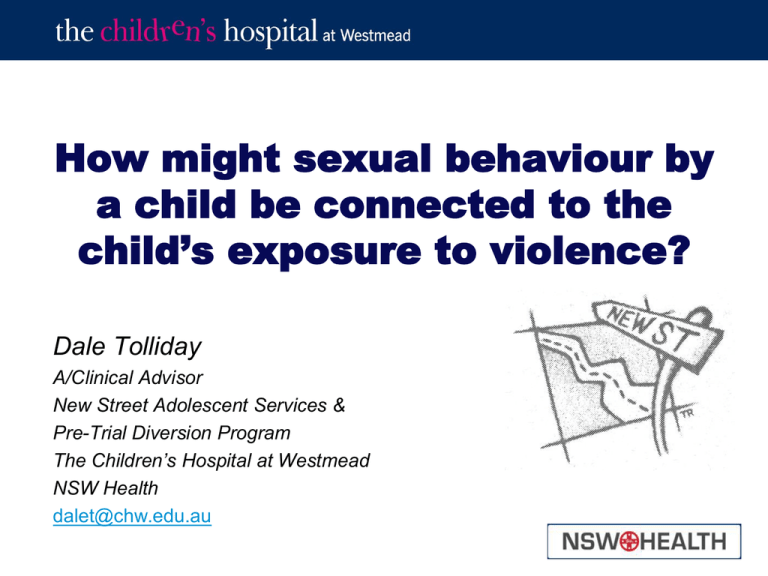
How might sexual behaviour by
a child be connected to the
child’s exposure to violence?
Dale Tolliday
A/Clinical Advisor
New Street Adolescent Services &
Pre-Trial Diversion Program
The Children’s Hospital at Westmead
NSW Health
dalet@chw.edu.au
Pat
• 11yo boy referred as had sexually abused his sister many times
over a period of over 12 months
• Also noted for sexual behaviours at school towards girls
• Lives with mother, step-father and two younger sisters
• Has moved between father and mother’s care over 10 times
(each time intention was for the move to be permanent)
• Changes of home and family movements resulted in 28 different
school enrolments for Pat
• Parents and step-father have experienced alcohol and drug
problems over a long period
• Pat has witnessed his mother being physically assaulted by his
step-father on a number of occasions. And verbal violence
frequently.
Domestic & Family Violence Forum
Springwood
2
Pat (continued)
•
•
•
•
•
When Pat threatened his step-father with the knife he was standing in
the kitchen between his step-father and his mother
His mother was on the floor having just been hit and knocked from her
feet by her partner (Pat’s step-father)
This was the first time Pat had witnessed his mother being assaulted by
his step-father …….. since she had returned from hospital having been
injured when he had pushed her down a staircase
Many aspects of the incident in the kitchen surprised me. One being
that Pat could not recall anyone asking him about himself. He was in
trouble for the dangerousness of his action (using the knife)
Pat said while he thinks he was angry, most of all he remembers being
“shit scared”
Domestic & Family Violence Forum
Springwood
3
Fay
• Is 10yo and has moved to live with her father and step-mother
after being sexually abused by her step-father (Fay’s mother’s
new partner)
• As well as having been sexually abused she has been exposed
to domestic violence over a long period of time
• Fay has sexually harmed her step-brother
Domestic & Family Violence Forum
Springwood
4
Hugh & Mark
• Are brothers aged 11 and 13
• They live with their grandparents
• Previously they lived with their parents who fought often. They
were exposed to frequent verbal violence.
• They never witnessed physical violence but saw their mother’s
injuries after. They could hear the physical violence
• From a young age they shared the same bed
• In the year before moving to their grandparents and in the time
since “they have engaged in sexual behaviour with each other”.
At least this is how it was initially presented. Closer assessment
showed that Mark led the way and the dynamic of the sexual
behaviour was abuse, not mutual conduct
Domestic & Family Violence Forum
Springwood
5
New Street Services
• NSW Health services for children and young people aged 1017yrs and their families, where those young people have
sexually abused another
• Services operate from sites in Nth Parramatta, Newcastle,
Tamworth and Dubbo (currently establishing)
• An interagency response for substantiated cases in relation to
which criminal prosecution will not take place
• An expanding network of services related to need (eg the Nth
Parramatta service has received 3-4 times the number of
referrals it can manage) and evaluation of service impact
Domestic & Family Violence Forum
Springwood
6
Sexual Abuse by children and
Young People
• Historically minimised
• Adolescents account for more than 30% of all sexual assaults
• A child is more likely to be sexually abused by another young
person than by a person of any other age category or by
relationship to the person who sexually abused them
• Children and young people who have sexually abused typically
have abused other children or young people closely connected
to them
• New Street consistently reports at least 50% of referrals are for
sibling sexual abuse
Domestic & Family Violence Forum
Springwood
7
Errors
This is a relatively new area of research and work. A number of
errors have been broadly recognised including:
• Adult interventions are not appropriate for children
• Children are developmentally incapable to take full responsibility
for every aspect of their conduct and lives
• Children who have sexually abused are not limited to human
beings who present risk to others
• Sexual Abuse behaviours do not arise as a result of a single or
narrow pathway
Domestic & Family Violence Forum
Springwood
8
Do they do it again (the
recidivism question)
• Apparently this is the only thing people want to know about
children who have sexually abused
• There is a significant rate of subsequent harm experienced by
children who have sexually abused
Domestic & Family Violence Forum
Springwood
9
But do they do it again?
Yes and No
• Most do not continue or re-appear as adults sexually abusing
• A significant minority sexually abuse again in the months after
disclosure or first detection. Safety planning which is nonpunitive is critical. At all times strategies undertaken must be
care based while not underestimating risk
• Counselling (specialised treatment) reduces re-abusing by 2/3
Domestic & Family Violence Forum
Springwood
10
So what has happened in the lives
of these children and young people?
Witnessed Domestic Violence
Most likely single prior experience present
• Gray et al
(1998)
70.2% (children)
• Ryan
(1996)
63% (adolescents)
• Rich
(2002)
68% ( “
)
82% (10-12 yo)
• Bailey (2000) Experiencing or witnessing Domestic Violence a
risk factor for developing aggressiveness and
violence
Domestic & Family Violence Forum
Springwood
11
New Street
09/10
No Abuse Identified
28%
Sexual Abuse
45%
Physical Abuse
41%
Emotional Abuse/Neglect
52%
Exposure to Domestic Violence 41%
Average (12 yrs)
31.6%
33.9%
31.6%
39.2%
31.3%
More than one form of abuse
35.5%
31%
Domestic & Family Violence Forum
Springwood
12
Complex Trauma
“The experience of multiple, chronic and prolonged,
developmentally adverse traumatic events, most
often of an interpersonal nature … and early life
onset”
Bessel van der Kolk (2005)
Quoted by Howard Bath in
“The Three Pillars of Trauma-Informed Care” (2008)
Domestic & Family Violence Forum
Springwood
13
Trauma responses
Complex trauma can predispose children to dysregulatory stress
responses
A long term effect of complex trauma is related to adaptive
responses and ability to move between them…..often
hyperarousal or dissociation
Perry 2010
How a child or young person manages is individually unique and
should be recognised as such and managing this is also
recognised as survival strategies at work
Domestic & Family Violence Forum
Springwood
14
?Causal
•
•
•
•
Possibly, depends on definition of causation
Complex trauma does not explain all
There are multiple pathways to sexual abuse behaviour
Are young people who have experienced complex trauma less
responsible?
• Is counselling/treatment different?
Domestic & Family Violence Forum
Springwood
15
In exposure to domestic violence, aside from the
neurobiological impacts, the child or young person is
being provided, through their lived experience, with a
dominant and gendered script for how they are
expected to ‘be’ in the world. The expectations others
do and will have of them and their developing
expectations of and for themselves. For males in
particular this typically involves a personal
engagement with notions of privilege and entitlement.
Domestic & Family Violence Forum
Springwood
16
So why sexual behaviour?
• It is self-reinforcing due to the intimacy and closeness
experienced as well as sexual elements
• Sexual abuse also includes being in control which is particularly
appealing to children exposed to complex trauma
• Being in control generally means feeling safe(r)
• Physiological responses in sexual behaviour can attend to some
of the neurobiological impacts of trauma such as hypervigilance
and elevated heart rates
Domestic & Family Violence Forum
Springwood
17
How to conclude?
•
•
•
•
•
•
•
Exposure to DV is present for a substantial proportion of young people
who have sexually abused
…as is exposure to other forms of abuse
There are multiple pathways to sexual abuse
Complex trauma is appearing as a current explanation. Important for
children who have experienced complex trauma but there is a danger
of believing it explains all
Management including counselling or treatment should always include
safety planning relevant to the child or young person’s needs
The child or young person’s safety must always be a consideration
Intervention must be based upon safety and connecting the child or
young person with family and their unique social ecology. When this is
done the child or young person should have a base of safety and
security from which to practise managing their emotional states in ways
which are not abusive of others and do not place themselves at risk of
abuse or harm
Domestic & Family Violence Forum
Springwood
18



